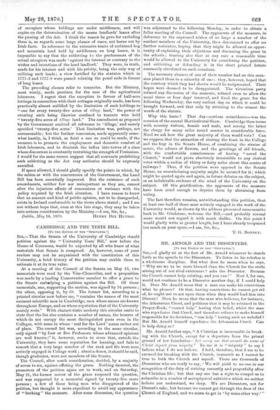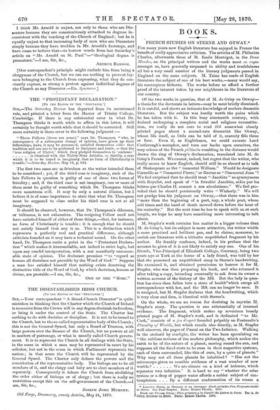MR. ARNOLD AND THE DISSENTERS.
(To THE EDITOR OF THE "SPECTATOR.1
gladly sit at the feet of Mr. Arnold whenever he stands forth as the apostle to the Dissenters. To listen to his rebukes is a wholesome discipline. But what does he mean when he says, "Why are we to be more blamed than the Church for the strife arising out of our rival existences ? asks the Dissenter. Because the Church cannot help existing, and you can !" Now I, for one, would not continue to be a Dissenter another day, if I could help it. Does Mr. Arnold mean that a man can make his convictions what he pleases? Or that, having convictions he cannot get rid of, he ought not to act upon them when they would lead him into Dissent? Does he mean that the man who believes, for instance, the Athanasian Creed, and petitions that it may be retained in the Prayer-Book, "cannot help" having that belief, whilst the man who repudiates that Creed, and therefore refuses to make himself responsible for its doctrines, "can help" having such an unbelief? But Mr. Arnold himself repudiates the Athanasian Creed. Can he help doing so ?
Mr. Arnold further says, "A Christian is inexcusable in break- ing with the Church, except for a departure from the primal ground of her foundation : Let every one that nameth the name of Christ depart from iniquity." To me it is " iniquity " to say I believe what I do not believe. I hold, therefore, that I am to be excused for breaking with the Church, inasmuch as I cannot be true to both the Church and myself. There are thousands of Dissenters who are ready to say, ' We will yield to no one in our recognition of the duty of striving earnestly and prayerfully after the Christian life ; but that any one has a right to compel us to subscribe to a number of metaphysical subtleties which we neither believe nor understand, we deny. We are Dissenters, not for Dissent's sake, but because we cannot get through the door of tbe Church of England, and we scorn to get in by some other way.'" I think Mr. Arnold is unjust, not only to those who are Dis- senters because they are conscientiously atttached to dogmas in- consistent with the teaching of the Church of England ; but he is equally unjust to that increasing body of men who are Dissenters simply because they have trodden in Mr. Arnold's footsteps, and have come to believe that—to borrow words from last Saturday's article on "Mr. Arnold on St. Paul "—" theological dogma is
premature."—I am, Sir, &c., ARTHUR RANSOM.
[Our correspondent's principle might exclude him from being a clergyman of the Church, but we can see nothing to prevent lay- men belonging to the Church from expressing, what they do con- stantly express, as strong a protest against individual dogmas of the Church as any Dissenter.—ED. Spectator.]































 Previous page
Previous page